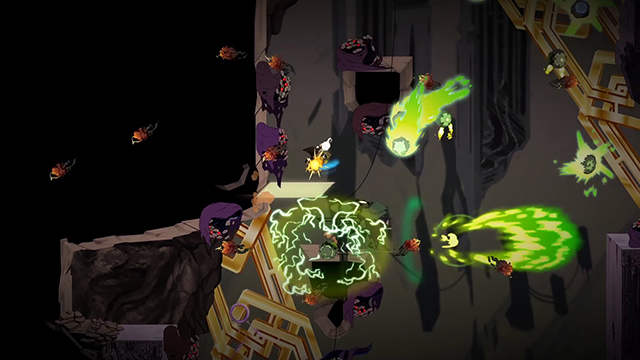With game-making as accessible as it is in 2017, one does not simply “make a metroidvania.” It’s true that you can, the tools are available, and game development has never been more indie-friendly or even individual-friendly than it currently is. And yet, there is always the question of whether you should. Clearly unintimidated by harrowing fears of mediocrity, Thunder Lotus Games has endeavored the crowded metroidvania space with its hand drawn, stylized Sundered. After spending around 45 minutes with the game at PAX East, it’s quite clear that they’re on to something.
My demo was guided by studio head William Dubé, whose booth at PAX appeared to be something of a metroidvania itself judging by the secret passageway that lead to my demo space, revealed by cleverly sliding aside a large cardboard sign. Once situated, I took control of Eshe, a “wanderer in a ruined world, trapped in ever-changing caverns teeming with eldritch horrors,” and my bonafide spelunking began from there.
Sundered’s controls immediately struck me as responsive, and this was heightened by my starting out with abilities not normally available early in the game; the ability to shield, and the ability to run up walls. Will told me from the start that action and adventure are the game’s primary genre labels, but was also OK admitting that it draws platforming inspiration from recent gems like Ori and the Blind Forest. Sundered’s layouts are comprised of series of rooms, some designed and some procedurally generated, with the objective being to reach new major powerups, extinguish hordes of hellish enemies, and subsequently reach an area’s boss. It’s a familiar formula, but far from a tired one, and the mix of prepared and procgen adds unique flavor not often seen.
I quickly discovered that death is a commonality, but it’s eased by a straightforward yet seemingly extensive skill tree toward which Eshe can invest crystals found on her journey. Though not an RPG, Sundered’s skill tree resembles what you might find in more candid role-playing encounters like Child of Light; a series of available skills, based on offense, defense, health, etc, that eventually chain to larger enhancements or even major abilities. There’s also a slot for what I believe are called traits, hot-swappable passives that will benefit your trek through the game’s partially randomized horrors. I didn’t dive into the skill tree extensively, but died enough times to power up my defense and health and eventually defeat the demo’s toughest enemy wave. If nothing else, the skill tree immediately distracts from any frustration borne from dying, which alone is a nice touch.

The game pulls a bit of a story maneuver that ties into gameplay, in which Eshe either becomes corrupted by sacrificing her humanity, or stays on the straight and narrow. I asked Will if this is your typical good vs. evil numerical calculation, to which he replied absolutely not; put simply, giving in to corruption will net you more powerful capability every time. This may sound great, but you’ll eventually begin to notice psychological costs for Eshe as well as other setbacks despite your ever-growing strength from floating humanity down the river. Though Sundered does intend to zero-in on three possible endings (one good, one evil, one in the middle), the idea is that the journey toward them not be so cut-and-dry. I applaud this self-awareness, and look forward to experiencing it in further detail.
I didn’t get to try all of Eshe’s unlockable abilities, though beyond shielding and wall-running I did encounter a few. Upon starting she’d already acquired a large, shoulder-mounted blaster, the biggest quirk of which was its enormous knockback that sends Eshe flying after each shot. There’s also a grapple ability that struck me as shockingly similar to what Specter Knight is capable of in the recent Shovel Knight expansion, only with a bit more fluidity and elastic range thanks to its hookshot-style nature. Will says he’s never even seen Specter of Torment, so I’ll chalk it up to clever minds thinking alike or something like that. The mechanic works and is especially fun when evading enemy hordes in hot pursuit, so it’s not something I take any issue with.

My demo concluded upon reaching a boss, whom I was not able to fight but was quite tantalizingly teased. From what I experienced, the quality of boss encounters is probably going to make or break my overall assessment of the game (so far what I’ve played has left a strong impression), so it’s something I’ll be keeping my eyes especially peeled for in the coming months. To the game’s credit, it already has a sense of unsettling atmosphere, which I was able to experience in bursts of headphone-wearing between asking Will questions. It’s very much a game whose sound design you’ll want to pay attention to.
Sony is helping Thunder Lotus with Sundered’s marketing, but it did begin humbly on Kickstarter like so many indie efforts of similar ilk. The game has enough going for it to impress at least some indelibility on its genre, a feat few games in the space can even begin to claim. You can grab Sundered in all of its spooky hand-drawn glory on both Steam and PS4 starting this summer, July 2017, and design for yourself then.











